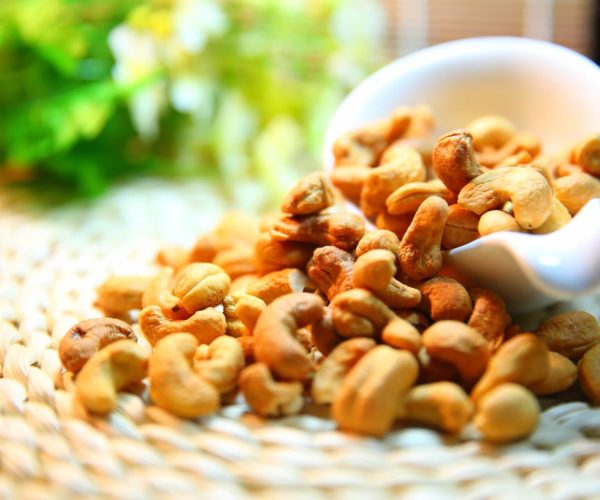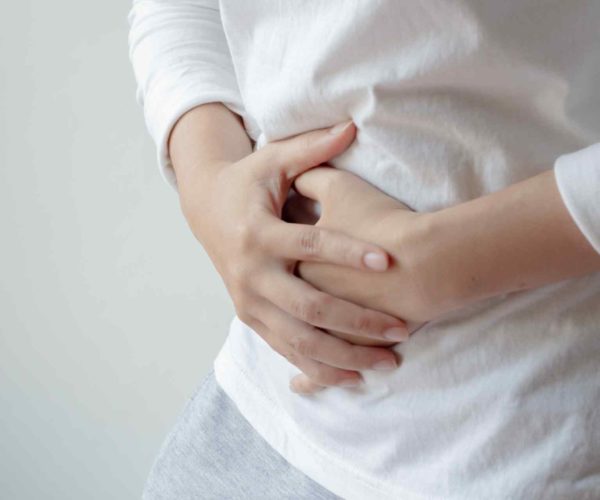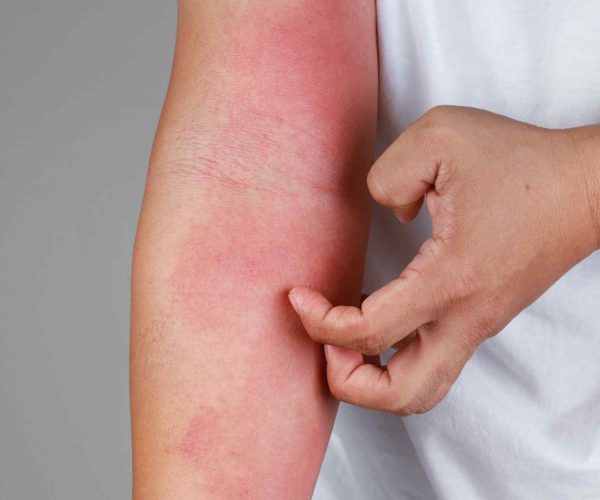9 Major Side Effects Of Eating Too Many Cashews
Cashew or cashew nut (Kaju) is a popular dry fruit that is eaten in a variety of ways around the world, including as a snack, a sweet component, and a topping on many vegetarian and nonvegetarian cuisines. Cashew nuts are high in healthy nutrients such as vitamins, minerals, antioxidants, flavonoids, and other compounds that are favorable to human health.
In normal meal proportions, cashew is LIKELY SAFE to ingest. Cashew’s side effects are really rare! However, if you consume too many cashews or are allergic to them, you may get bloating, constipation, weight gain, and joint swelling.
In this article, we will learn about the major side effects of eating too many cashews.
Side Effects Of Eating Too Many Cashew Nuts
Some common side effects of overeating cashews are as follows

1. May Cause Weight Gain
Eating cashew nuts in moderate quantity may help in weight management but this could turn negative when cashew nuts are consumed in excessive quantity. Cashews are a good source of energy because of their high calorific value, which means one can get a good amount of energy just by eating a handful of cashew nuts.
They are also a good source of monounsaturated fat which keeps our cardiovascular system healthy but even nutritious fats can be dangerous for our body when consumed in excess quantity.
Eating just one ounce of dry-roasted cashews provides 163 calories and this number can rise to as high as 786 calories if you have eaten around one cup of cashew nuts, which is not at all a hard task if you are snacking directly from the bag.
Eating around one cup of cashew nuts provides as much as 40 percent of our daily calories need (based on a 2000 calories diet). Eating more calories may give rise to weight gain which is not at all beneficial for our health as it may give cause obesity and give rise to other health problems like high cholesterol, diabetes, metabolic syndrome, cancer, stroke, cardiovascular problems, etc.
Because of the “weight gain” risk associated with cashew nuts, it is always advisable to eat cashew nuts in a limited quantity and not as a “movie time snack “ as there is a high risk of overheating which may lead to obesity and other problems.
2. Headache

Headache is the second most common cashew side effect. Some people experience headaches (migraines) after eating peanuts, almonds, cashews, and other nuts.
Some people are hypersensitive to these meals, even though they are typically quite healthy.
Seasonal changes — For some people, some seasonal changes might cause headaches. Tyramine and phenylethylamine, which are good for human health and help maintain normal blood pressure levels and create a sense of well-being, might trigger headaches in people who are sensitive to these amino acids.
Cashews are rich in Tyramine and phenylethylamine.
[irp posts=”13789″ ]
3. Presence Of Excess Sodium
The level of sodium in cashew nuts is not very high and in fact, there is only 12 mg of sodium in 100 grams of cashew nuts. However, being a dry fruit, there are many times when cashew nuts are served in salted form and the level of sodium in salted cashew nuts is around 181 milligrams of sodium per ounce ( which roughly equates to 638 milligrams of sodium per 100 grams of cashew nuts ).
This high level of sodium which is very dangerous to our health as it may increase our blood pressure level and may give rise to other cardiovascular problems.
As per the Centres For Disease Control and Prevention, healthy people should get no more than 2300 milligrams of sodium per day and those who are at risk of heart disease should not get more than 1500 milligrams of sodium. Although the level of sodium in cashew nuts ( even in salted one) don’t seem quite high, it is important to note that if one is overeating cashew nuts then this number can quickly add up.
We also get sodium from other food items we eat and these days people eat a lot of junk food ( which is already high in sodium content) so this risk of high sodium intake increases even further.
The best way to deal with this issue is to eat cashew nuts in moderation and give more preference to eating unsalted cashew nuts. If you are more concerned about taste then it’s okay to eat salted cashew nuts once in a while but a limited quantity.
If you are at risk of cardiovascular diseases or high blood pressure then it is better to consult your doctor about eating salted cashew nuts.
[irp posts=”274″ ]
4. Bloating

Eating fatty nuts like cashews (which, like all nuts, are high in fat) can cause bloating. Gas that doesn’t travel through your system through belching or farts builds up in the stomach and intestines, causing bloating. If you eat too many cashew nuts, your stomach will take longer to empty, causing bloating and changes in your bowel motions.
Unfortunately, all fatty foods, including cashews, can induce these negative effects in people with functional disabilities if consumed in excess. The majority of nuts include phytates and tannins, which make them tough to digest in our stomachs. Nuts also include a variety of fats that might cause diarrhea. Cashews can cause bloating in certain people for a variety of reasons.
5. Raw Cashew Nuts Are Dangerous
Although these days it is not so common to find raw or in-shell cashews at the store but even if you do then it’s best to stay away from them and give preference to commercially prepared cashew nuts.
This is because raw cashews are related to poison ivy and poison sumac and oils present in the cashew shells can cause itching and unpleasant reactions on our skin.
Commercially prepared cashew nuts are safe for eating because they are de-shelled and roasted at a high temperature and this destroys any lingering toxic oils and makes them perfectly safe for eating.
[irp posts=”13784″ ]
6. May Destroys Balance Of Other Food Materials
Eating cashew nuts is good for our health because of the number of nutrients present in them but even after the presence of a large number of nutrients in cashew nuts, they are not a complete food and our body needs other important nutrients which we get from other food materials like fruits, vegetables, and grains, etc.
Because of this reason, it is better to eat cashew nuts in a limited quantity and as per the recommendation of The U.S. Department of Agriculture’s MyPlate guidelines, it is better to keep the high protein intakes like nuts, beans, tofu, and fish to 5.5 ounces per day.
Eating cashew nuts ( and other high protein foods) in limited quantities will ensure that there is enough room for other important food materials in our bodies. So, in short, eat cashew nuts ( in moderation) for your good health but don’t let cashew nuts or any other food item dominate your diet.
7. May Cause Allergies

Eating too many cashew nuts is dangerous for our health even because of the risk of allergic reactions attached to them. As per a study published in the December 2003 edition of the journal “Allergy”, allergies associated with cashews are rising day by day and these allergic reactions are even more serious because they affect young children who may never have been exposed to these allergies.
As per another article published in the journal “Archives of Diseases In Childhood”, it was found that anaphylaxis or constricting of the airways was found to be more common in people suffering from cashew allergies than in people suffering from peanut allergies.
[irp posts=”15368″ ]
8. May Interfere With Certain Medications
Cashew nuts are an excellent source of magnesium ( 82.5 mg of magnesium per ounce of cashew nuts) which provides a lot of benefits like regulating body temperature, detoxification, keeping bones and teeth healthy, and many more benefits. However, there is also some risk associated with magnesium and one such risk is its ability to interfere with several drugs.
As per the University of Maryland Medical Center notes, it was found that many drugs interact with magnesium ( which is present in cashews at a high level ) and disturb the effect of those drugs. Quinolone antibiotics like ciprofloxacin and magnesium bind together and may prevent adequate absorption of antibiotics.
Magnesium may even interact with blood pressure medications and calcium channel blockers, increase the risk of side effects associated with these medications and cause nausea and water retention. It can even react with diabetic medication, thyroid medications, diuretics, and penicillamine.
Some Drugs that MAY interact with cashew nut kernels:
- Insulin
- Glimepiride (Amaryl)
- Glyburide (DiaBeta Glynase PresTab, Micronase)
- Pioglitazone (Actos)
- Rosiglitazone (Avandia)
- Chlorpropamide (Diabinese)
- Glipizide (Glucotrol)
- Tolbutamide (Orinase)
So, if you are on any kind of medication like diabetics medication, antibiotics medication, thyroid medications, etc. then it is better to first talk to your doctor about the same and eat cashew nuts only as per the recommendation of a doctor.
9. May Cause High Blood Pressure
Eating too many salted cashew nuts may increase the blood pressure level of our body and give rise to hypertension and other health problems because of the high level of sodium ( around 181 milligrams of sodium per ounce of cashew nuts ) present in salted cashew nuts. It is important to note that the level of sodium in unsalted cashew nuts is very low ( around 12 milligrams of sodium per 100 grams of cashew nuts ) which means it is better to eat unsalted cashew nuts and say no to salted cashew nuts.
If you still want to eat salted cashew nuts then eat them only once in a while and that too in moderation. Although the level of sodium in unsalted cashew nuts is not so high ( in comparison to salted cashew nuts) but still it is better to eat even the unsalted cashew nuts in limited quantities ( to avoid other side effects of cashew nuts overeating ).
[irp posts=”13772″ ]
Other Nuts vs. Cashews
In comparison to other nuts, how do cashews fare? Although there are some significant distinctions, they are all fairly equal. According to USDA data, cashews have somewhat less protein and slightly more natural sugars than almonds and walnuts.
Almonds have a few more calories (162 per ounce), but they also have more fiber (3.5 grams per ounce vs. less than 1 gram per ounce in cashews). Dietary fiber has a long list of health advantages, from weight loss to cholesterol reduction. According to UCSF Health, increasing fiber consumption can help prevent heart disease, diabetes, constipation, and colon cancer.
Cashews have a higher saturated fat content than almonds and walnuts, which both have a higher unsaturated fat content. The health benefits, however, are unlikely to be affected.
Saturated fat has a bad reputation, although the problem is large with animal fats, which contain longer carbon-atom chains. According to a study published in the International Journal of Cardiology in March 2019, longer-chain saturated fatty acids are linked to a higher risk of heart attack, while shorter-chain saturated fatty acids have the opposite effect.
Finally, what is the verdict? Cashews are good for you as long as you consume them in moderation. However, like with any diet, diversity is crucial to acquiring a broad range of nutrients, so mix it up with almonds, walnuts, pecans, hazelnuts, and Brazil nuts now and again.
Frequently Asked Questions
1. How many cashews may I eat in a single day?
Cashews are high in unsaturated fats, as well as considerable amounts of copper, manganese, magnesium, zinc, iron, phosphorus, vitamin K, vitamin E, and B vitamins, all of which are highly healthy in MODERATE amounts. To avoid weight gain, nutritionists recommend limiting cashew nut kernel consumption to 5–10 cashews per day.
You can get a major supply of fat and a secondary source of protein by eating 15–30 cashew nuts each day. Not all fats are unhealthy for you; in fact, some fats can benefit your heart health.
According to several studies, consuming more nuts like cashews can lessen your risk of cardiovascular disease. This could be accomplished by lowering blood pressure and cholesterol levels… Potassium, vitamins E and B-6, and folic acid, among other vitamins and minerals found in nuts, aid in the prevention of heart disease.
2. Is There Such a Thing As Too Many Cashews?
A daily intake of more than 40 nuts is excessive! That suggests you’re eating too many cashew nuts. It’s a different scenario if you’re an athlete because you’re doing activities and your metabolism and digestion process work differently than folks who don’t engage in physical activity. Because you have a fast metabolism, you can eat up to 40 nuts each day.
3. When it comes to cashews, how much is too much?
Eating more than 30 cashew nuts a day is too much.
4. can eating too many cashews cause diarrhea?
There is no definitive answer to this question as everyone’s digestive system responds differently to different foods. However, some people may experience diarrhea after eating too many cashews due to the high-fat content of the nuts. Fat is a known trigger for diarrhea in some people, so it is best to avoid eating large quantities of cashews if you are susceptible to this condition.
5. can eating too many cashews cause stomach problems?
Cashews are a type of tree nut that is often consumed as a snack. Though they are generally considered healthy, there is some concern that eating too many cashews can lead to stomach problems.
There are a few reasons why this might be the case. First, cashews are high in fat, which can sometimes lead to digestive issues. Additionally, cashews contain a compound called urushiol, which can irritate the gut.
If you experience stomach pain after eating cashews, it is best to speak with a doctor to rule out any other potential causes. Additionally, it is important to moderate your intake of cashews to avoid any gastrointestinal issues.
6. can you die from eating too many cashews?
Yes, you can die from eating too many cashews. Cashew toxicity is a real risk and it should not be taken lightly. There have been numerous reports of people getting sick from eating large amounts of cashews, and even fatalities have occurred as a result. Symptoms of cashew toxicity typically start with gastrointestinal problems (such as diarrhea or vomiting), followed by trouble breathing and then cardiac arrest.
7. What happens on eating too much cashew nuts during pregnancy?
Cashew nuts can also be harmful to pregnant women because they are high in cholesterol. Cholesterol is a type of fat that can be harmful to the mother and the baby. High levels of cholesterol can lead to a condition called pre-eclampsia. Pre-eclampsia is a dangerous condition that can lead to the death of the baby.
Another problem with cashew nuts is that they are high in protein. Protein is a type of nutrient that can be harmful to pregnant women. Protein can cause a problem called proteinuria. Proteinuria is a condition in which there is too much protein in the urine. This can be a sign that the pregnant woman is having a problem with her kidney function.
8. will eating too many cashews make you fat?
Eating too many cashews can lead to weight gain. The cashew husk, which is the outer covering of the cashew nut, contains a high amount of the satiating compound methanol. This compound can help you feel full after eating small amounts of food. Over time, repeated exposure to methanol can lead to weight gain.
Also, cashews are high in fat and calories. One ounce (28 grams) of cashews contains 180 calories and 36 grams of fat. This makes them an unhealthy snack choice for people looking to maintain healthy body weight.
9. can eating too many cashews cause kidney stones?
If you are eating a lot of cashews, you may be increasing your risk of developing kidney stones. Cashews are a high-fat and high-calorie food and they contain a lot of cashew protein. These proteins are broken down quickly, leading to the release of cashew acids. These acids can combine with other minerals in your urine to form stones.
10. can eating too many cashews make you constipated
Eating too many cashews can make constipation worse. the fiber in cashews can cause problems when not digested properly. drinking water and eating a balanced diet with enough fiber can help to prevent or treat constipation caused by cashews.
11. can eating too many cashews cause oily stool?
Cashews are a type of nut that is generally considered to be healthy. They are a good source of protein, fiber, and vitamins, and they contain healthy fats that can help protect your heart. However, like all things, cashews can be eaten in moderation. Eating too many cashews can lead to some unwanted side effects, such as oily stool.
Oily stool occurs when there is too much fat in the stool. This can happen if you eat too many fatty foods, such as cashews. When there is too much fat in the stool, it can be difficult to pass, and it may also lead to diarrhea. If you eat a lot of cashews and you notice that your stool is oily, you may want to cut back on your consumption. You should also drink plenty of water and eat plenty of fiber to help keep your stool
Disclaimer
This article provides general information about the topic and is not to be taken as medical advice or as an alternative to medical advice, treatment, and/or diagnosis. Always consult with your doctor before trying out any of the remedies/recipes suggested in the blog post.
P.S- Consider sharing this post, if you find it useful and/or interesting.
